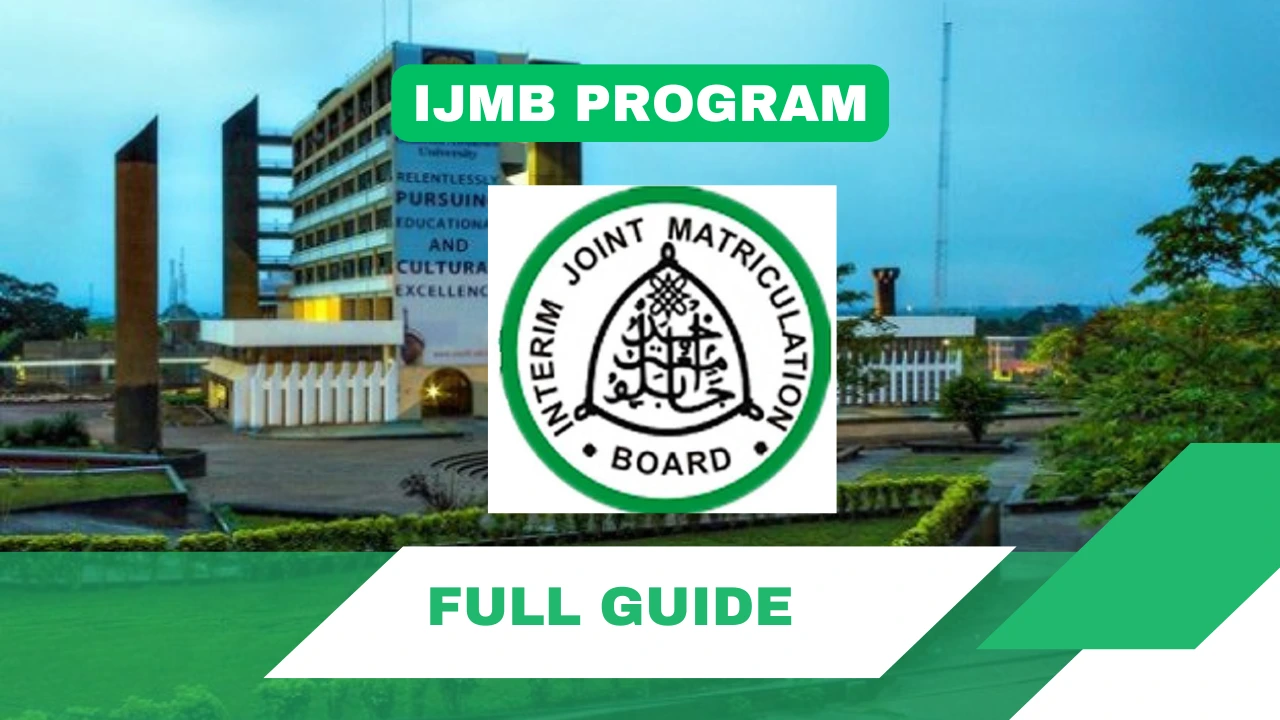If you are looking to get admission to Nigerian universities without taking the JAMB exam, IJMB might be the right choice for you. The Interim Joint Matriculation Board (IJMB) is a recognized advanced-level program that enables students to gain direct admission into the 200-level of Nigerian universities. The IJMB has been approved by the Nigerian University Commission (NUC) and moderated by Ahmadu Bello University (ABU), Zaria.
The program is an excellent option for students seeking an alternative to the JAMB or those looking for quicker admission routes.
In this guide, we’ll provide all the details concerning the IJMB-2025. How it operates in terms of eligibility, subject combinations, applications, the process for applying, universities accepting it, and its benefits.
What is IJMB?
The Interim Joint Matriculation Board (IJMB) is a 9-12-month academic program that enables those who qualify to be granted the right to admission directly into 200-level courses at the majority of Nigerian universities. The program was established in 1975 through Ahmadu Bello University (ABU) and has gained widespread acceptance throughout the country.
The program is designed specifically for students who have passed WAEC, NECO, or NABTEB and want to bypass the 100-level of education at university. Once they have completed IJMB, students are eligible to apply to be considered for direct entry into the university that they prefer.
How Does IJMB Work?
Students are required to select 3 A-level subjects in areas related to their college program. The subjects are taught rigorously over between 9 and 12 months. Then, after the course, students have to take tests, and the score is calculated on the score system.
The IJMB points can then be applied to be considered for direct Admission to any Nigerian school that is willing to accept them.
Example:
- If a student wants to pursue a degree in Medicine could choose to study: Biology, Chemistry Physics.
- The student who is aiming to study Law may choose: Government, Literature and CRS.
Benefits of IJMB
The IJMB program gives students a unique alternative to the conventional JAMB route. It opens up opportunities for direct admission to the 200-level at a variety of Nigerian universities, as well as offering the flexibility and reliability of an academic pathway. Here are a few of the most significant benefits IJMB gives:
- There is no need to write JAMB
- Admission into the 200-level
- Accredited in more than 70 Nigerian institutions
- This can be combined with other courses, like learning to be a skilled
- The results last for 7 years.
- Affordable tuition fees
- No interruptions or strikes
Eligibility Requirements
To be eligible to be a candidate for IJMB, you must
- You must have at least 5 O’Level credits (WAEC, NECO, NABTEB), either one or two times.
- You must be willing to attend an approved IJMB center.
- You must be able to commit between 9 and 12 months for intensive academic instruction
Subject Combinations for IJMB
Selecting the correct subjects is vital. The IJMB subjects should be in line with your university program.
Examples:
- Engineering: Mathematics, Physics, Chemistry
- Medicine: Biology, Chemistry, Physics
- Law: Literature, Government, CRS
- Accounting: Accounting, Economics, Business Management
- Mass Communication: Literature, Government, CRS
Always consult your academic advisor or the IJMB center to get the right subject advice.
How to Apply for IJMB 2025
Making an application to apply for IJMB is straightforward. You must follow these instructions:
- Choose an accredited Centre: Choose a reputable and recognized IJMB study center near you.
- The Application Form: The majority of centers provide electronic forms or PDF files that you can download. Complete your information correctly.
- The Application Fee The payment is typically between N5,000 and N15,000 based on the location of the center.
- Submit Required Documents:
- WAEC/NECO/NABTEB results (or awaiting result slip)
- Passport photo
- Birth certificate
- Accept Admission Letter: After being accepted, you’ll receive a confirmation letter of your admission.
- Introduction to Lectures: Lectures typically start with the month of February or March. Registration is recommended early.
Universities that Accept IJMB in Nigeria
Here are the lists of more than 70 institutions in Nigeria that accept IJMB as direct entry.
University | Location |
|---|---|
Ahmadu Bello University (ABU) | Zaria, Kaduna State |
University of Ilorin (UNILORIN) | Ilorin, Kwara State |
University of Lagos (UNILAG) | Lagos State |
University of Benin (UNIBEN) | Benin City, Edo State |
University of Port Harcourt (UNIPORT) | Port Harcourt, Rivers State |
Delta State University (DELSU) | Abraka, Delta State |
Kaduna State University (KASU) | Kaduna, Kaduna State |
University of Jos (UNIJOS) | Jos, Plateau State |
Imo State University (IMSU) | Owerri, Imo State |
Ekiti State University (EKSU) | Ado-Ekiti, Ekiti State |
Federal University of Technology, Minna (FUTMINNA) | Minna, Niger State |
Federal University of Technology, Owerri (FUTO) | Owerri, Imo State |
University of Abuja (UNIABUJA) | Abuja, FCT |
Abia State University (ABSU) | Uturu, Abia State |
Ladoke Akintola University of Technology (LAUTECH) | Ogbomosho, Oyo State |
Olabisi Onabanjo University (OOU) | Ago Iwoye, Ogun State |
Federal University, Dutse (FUD) | Dutse, Jigawa State |
Federal University, Lafia (FULAFIA) | Lafia, Nasarawa State |
Federal University, Wukari (FUWUKARI) | Wukari, Taraba State |
Federal University, Lokoja (FULOKOJA) | Lokoja, Kogi State |
Federal University, Oye-Ekiti (FUOYE) | Oye-Ekiti, Ekiti State |
Federal University, Kashere (FUK) | Kashere, Gombe State |
Federal University, Birnin Kebbi (FUBK) | Birnin Kebbi, Kebbi State |
Federal University, Dutsin-Ma (FUDMA) | Dutsin-Ma, Katsina State |
Federal University, Gusau (FUGUS) | Gusau, Zamfara State |
University of Calabar (UNICAL) | Calabar, Cross River State |
University of Uyo (UNIUYO) | Uyo, Akwa Ibom State |
Ebonyi State University (EBSU) | Abakaliki, Ebonyi State |
Ambrose Alli University (AAU) | Ekpoma, Edo State |
Benue State University (BSU) | Makurdi, Benue State |
Kogi State University (KSU) | Anyigba, Kogi State |
Nasarawa State University (NSUK) | Keffi, Nasarawa State |
Gombe State University (GSU) | Gombe, Gombe State |
Bauchi State University (BASUG) | Gadau, Bauchi State |
Taraba State University (TSU) | Jalingo, Taraba State |
Adamawa State University (ADSU) | Mubi, Adamawa State |
Yobe State University (YSU) | Damaturu, Yobe State |
Niger Delta University (NDU) | Wilberforce Island, Bayelsa State |
Rivers State University (RSU) | Port Harcourt, Rivers State |
Cross River University of Technology (CRUTECH) | Calabar, Cross River State |
Enugu State University of Science and Technology (ESUT) | Enugu, Enugu State |
Chukwuemeka Odumegwu Ojukwu University (COOU) | Uli, Anambra State |
Lagos State University (LASU) | Ojo, Lagos State |
Plateau State University (PLASU) | Bokkos, Plateau State |
Umaru Musa Yar'adua University (UMYU) | Katsina, Katsina State |
Kebbi State University of Science and Technology (KSUSTA) | Aliero, Kebbi State |
Sokoto State University (SSU) | Sokoto, Sokoto State |
Kano University of Science and Technology (KUST) | Wudil, Kano State |
Kwara State University (KWASU) | Malete, Kwara State |
Ibrahim Badamasi Babangida University (IBBU) | Lapai, Niger State |
Akwa Ibom State University (AKSU) | Ikot Akpaden, Akwa Ibom State |
Osun State University (UNIOSUN) | Osogbo, Osun State |
Ondo State University of Science and Technology (OSUSTECH) | Okitipupa, Ondo State |
Michael Okpara University of Agriculture (MOUAU) | Umudike, Abia State |
Federal University of Agriculture, Makurdi (FUAM) | Makurdi, Benue State |
Federal University of Petroleum Resources, Effurun (FUPRE) | Effurun, Delta State |
Federal University of Technology, Akure (FUTA) | Akure, Ondo State |
Modibbo Adama University of Technology (MAUTECH) | Yola, Adamawa State |
Nigerian Defence Academy (NDA) | Kaduna, Kaduna State |
Bingham University | Karu, Nasarawa State |
Nile University | Abuja, FCT |
Igbinedion University | Okada, Edo State |
Madonna University | Elele, Rivers State / Okija, Anambra State |
Bowen University | Iwo, Osun State |
Lead City University | Ibadan, Oyo State |
Caleb University | Imota, Lagos State |
Al-Hikmah University | Ilorin, Kwara State |
Crescent University | Abeokuta, Ogun State |
Adeleke University | Ede, Osun State |
Achievers University | Owo, Ondo State |
Redeemer’s University | Ede, Osun State |
Benson Idahosa University | Benin City, Edo State |
Joseph Ayo Babalola University (JABU) | Ikeji-Arakeji, Osun State |
Afe Babalola University (ABUAD) | Ado-Ekiti, Ekiti State |
Always verify the Direct Entry admissions prerequisites at the school you are interested in before applying.
IJMB Grading and Point System
Every subject is graded according to the following:
- A = 5 Points
- B = 4 Points
- C = 3 Points
- D = 2 Points
- E = 1 Points
- F = 0 Points
Example: If you get
- Biology—A (5)
- Chemistry—B (4)
- Physics – C (3)
Your score is 5 + 4 + 3 = 12 points (which could be termed to be very acceptable and is a good candidate for competition courses).
A majority of schools require a minimum of six points to be admitted. Courses that are competitive, like law, medicine, or engineering, might require a minimum of 10 points or more.
Tuition Fees and Costs
IJMB charges vary by the state of study and by the center. In general, students need to save.
- Registration fee: N5,000 – N15,000
- Tuition fee: N80,000 – N150,000
- Accommodation: N30,000 – N70,000 (optional)
Some centers provide flexible payment options.
Best States to Study IJMB in Nigeria
Certain states have IJMB-accredited centers and have better facilities.
- Kaduna
- Kano
- Lagos
- Oyo (especially Ibadan)
- Osun
- Ilorin (Kwara State)
- Nasarawa
- Abuja (FCT)
Find a hostel that is well-equipped, as well as a library and lab infrastructure.
FAQs about IJMB
FAQs About IJMB
What exactly is IJMB? IJMB (Interim Joint Matriculation Board) is a 9-12-month advanced-level program that permits candidates to get straight entry to the 200-level university courses at Nigerian universities without completing JAMB.
Who qualifies to participate in the IJMB program?
Anyone possessing five O’Level credits from pertinent areas (WAEC, NECO, or NABTEB) that are obtained in just one or two sessions is eligible.
What’s the duration of the IJMB run?
The program’s duration ranges from 9 to 12 months, depending on the institute of study.
Could IJMB’s scores be used to gain admission in other countries?
It is not possible. IJMB is only recognized by Nigerian institutions for direct entry admission purposes.
What is the number of points I require in the IJMB to gain admission?
Most institutions accept a minimum of six points. Competitive courses, like medicine or law, may require at least 10 points.
Do I need JAMB to utilize IJMB?
It is not. IJMB is an alternative to JAMB. The application process is via Direct Entry (DE) after completing the application.
Is it possible to mix IJMB results with the WAEC/NECO/NABTEB?
Yes. Most universities allow students to mix IJMB results together with O-Level results in order to gain admission.
Is IJMB recognized at the majority of Nigerian institutions?
IJMB is a recognized institution by more than 70 Nigerian universities that including private and public universities.
Are there any opportunities to apply to IJMB while waiting for results?
Yes. You can register using an awaiting outcome; however, you need to submit the O’Level scores prior to university admission.
What is the way that was IJMB evaluated?
IJMB utilizes a points-based system of grading, which is A = 5, B = 4, C = 3, 2 = 1, and F = 0. Your total score will determine your strength for admission.
What are the subjects offered by IJMB? They are organized by combination, such as sciences (biology, chemistry, and physics) and arts (literature, CRS, linguistics, and government), as well as commercial (accounting, economics and management, and business management).
What date will IJMB lectures begin?
Lectures generally start around February or March every year, based on the institute.
What is IJMB’s price?
Total costs vary between N90,000 and N200,000, including registration fees as well as tuition and lodging.
Which are the most suitable states for studying IJMB?
States with well-known centers are Kaduna, Lagos, Kwara, Osun, Abuja, and Ibadan.
What can I do in the event that I fail the IJMB?
You may renew your enrollment in the program or consider other options such as JUPEB, JAMB, or diploma programs.
IJMB vs JAMB vs JUPEB
Feature | IJMB | JAMB | JUPEB |
Duration | 9-12 months | One exam | 9-12 months |
Result Validity | 7 years old | 1 year | 3 years old |
Admission Level | 200 Level | 100 Level | 200-level |
University Acceptance | More than 70 universities | All Universities | 60+ Universities |
Moderating Body | ABU Zaria | JAMB | UNILAG |
Conclusion
The IJMB Program can be a viable option for students hoping to be admitted at the 200 level to Nigerian universities without having to write JAMB. This saves time and gives higher chances for admission and is well-received.
If you’ve got at least five O-Level credits and you are prepared to continue your studies for 9-12 months, IJMB could be an effective and secure choice.
Are you eager to get started? Check out universities.ng to find verified IJMB centers, admission guides, and updates.
Keep your eyes on the ball, and stay up-to-date. The journey to university begins now!








